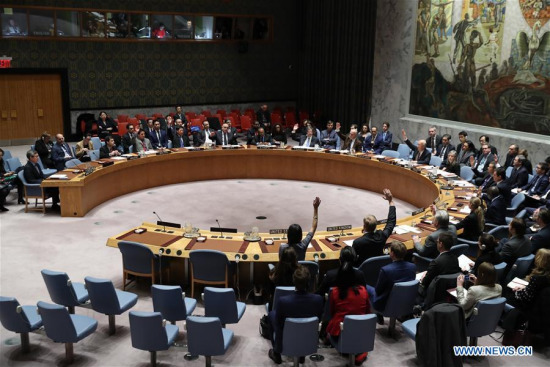
Photo taken on Dec. 22, 2017 shows theUnited Nations Security Council voting on a resolution on the Democratic People's Republic of Korea (DPRK) at the UN headquarters in New York. The United Nations Security Council on Friday adopted a resolution to tighten sanctions against the DPRK. (Xinhua/Wang Ying)
Looking back on the year of 2017, the United Nations, while trying hard to uphold international peace and security and committed to global governance, has withstood strains of severe traditional and non-traditional challenges and threats.
In the face of multiple unprecedented challenges and threats as well as snowballing difficulties of global governance, the vast majority of the UN member states are rallying around the lofty ideal: making the world a better and safer place to live.
TOP CONCERN: TENSIONS ON KOREAN PENINSULA
In addition to augmenting traditional challenges and threats, non-traditional ones functioning as terrorism and extremism, nuclear crisis, trans-boundary crimes, refugee crisis, drug trafficking, climate change, cyber security and other global problems are running rampant, posing severe threats and challenges to the world.
Among them, the nuclear crisis on the Korean Peninsula has been recognized as the top security concern of the year, disturbing the relations among major powers.
Tensions on the Korean Peninsula have reached an unprecedented level in 2017 due to a nuclear test and multiple missile launches by the DPRK and constant U.S.-South Korea joint military drills.
The crisis has also been worsened by the exchange of personal insults and confrontational rhetoric raising the specter of war between the United States and the DPRK.
UN Secretary-General Antonio Guterres said on Dec. 15 that he was deeply concerned over the risk of military confrontation on the Korean Peninsula.
Describing the situation on the Korean Peninsula as "the most tense and dangerous peace and security issue in the world today," he warned: "Any military action would have devastating and unpredictable consequences."
In 2017, the DPRK conducted activities related to its nuclear and ballistic missile programs "at an alarming and accelerated pace," he said, adding that over the year, the DPRK conducted 20 ballistic missile launches.
On Sept. 3, the DPRK conducted its sixth nuclear explosive test, involving what it claimed was a "two-stage thermo-nuclear weapon," he added.
UN Under-Secretary-General for Political Affairs Jeffrey David Feltman visited the DPRK on Dec. 5-8, the first in-depth political exchange of views between the UN Secretariat and officials in Pyongyang in almost eight years. But the visit seemed to have produced little positive results.
In response to the crisis, the Security Council has once and again called emergency meetings over the year to discuss ways and means in the hope to contain the development of the situation.
The Security Council on Dec. 22 unanimously approved new sanctions targeting DPRK's economy following the launch of a ballistic missile on Nov. 29 that the DPRK said it could target the entire continental U.S.
The new restrictions were meant to slash the DPRK's imports of refined petroleum products, further restrict shipping and impose a 24-month deadline for expatriate the DPRK's workers to be sent home.
The secretary-general welcomed the continued unity of the Security Council, which is essential to achieve the goal of denuclearization and create the space for diplomatic initiatives aimed at achieving it in a peaceful manner.
MANIFOLD OTHER CHALLENGES, THREATS
UN statistics show that an unprecedented 65.6 million people around the world have been forced from home. Among them are nearly 22.5 million refugees, over half of whom are under the age of 18.
There are also 10 million stateless people who have been denied a nationality and access to basic rights such as education, healthcare, employment and freedom of movement.
In a world where nearly 20 people are forcibly displaced every minute as a result of conflict or persecution, said the UN Refugee Agency.
The world's fastest growing refugee crisis evolved in Myanmar. Driven by violence and human rights abuse, more than 600,000 stateless Rohingya fled to Bangladesh, where the fragile infrastructure is overwhelmed. The UN scaled up emergency aid and called on Myanmar to end military operations against the Rohingya.
In Yemen, 8.5 million people are on the brink of the world's largest famine in modern times. Water and sanitation systems are all but destroyed, sparking a deadly cholera outbreak. The UN sent in emergency supplies and urged all parties not to block civilians from humanitarian aid.
Four famines, in Yemen, South Sudan, Somalia and Nigeria, are the result of unresolved conflicts exacerbated by droughts and missed harvests.


















































